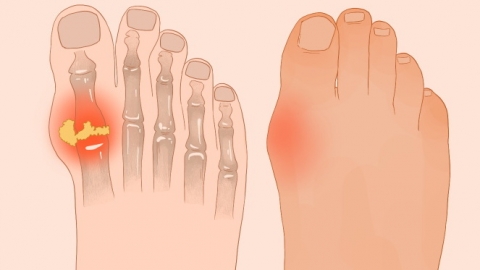脚跟增生走路痛How toTreatment
In general, heel pain caused by bone spurs during walking may result from long-term wear and irritation, age-related tissue degeneration, plantar fasciitis, Achilles tendinitis, gouty arthritis, and other causes. It is recommended to seek medical attention promptly, identify the underlying cause, and then improve symptoms under a doctor's guidance through conservative treatments, medications, surgery, or other methods. Specific analysis is as follows:

1. Long-term wear and irritation: Wearing hard-soled shoes for extended periods, frequent walking, or prolonged standing can continuously rub and compress the heel, triggering bone spur formation. Pain occurs during walking when the bony growth presses on surrounding tissues. Choose soft, breathable shoes with good arch support, and avoid prolonged walking or standing.
2. Age-related tissue degeneration: With aging, the heel cartilage gradually wears down. Bone repair processes may lead to bone spurs, while surrounding ligaments and fascia lose elasticity, making pain more likely during walking. Daily heel stretching exercises such as wall-supported calf raises or foot massages can help enhance the resilience of tissues around the heel.
3. Plantar fasciitis: Repeated strain damages the plantar fascia, causing aseptic inflammation. This inflammatory response can worsen heel spurs and cause significant pain while walking, especially worse upon waking or after prolonged rest. Patients should follow medical advice to take medications such as celecoxib capsules, diclofenac sodium sustained-release tablets, or ibuprofen sustained-release capsules to relieve pain.
4. Achilles tendinitis: Repetitive stress and overuse injure the Achilles tendon, leading to inflammation. The inflammation may spread to the heel area, triggering or exacerbating bone spurs. Pain occurs during walking due to tension in the Achilles tendon. Under medical guidance, patients may use etoricoxib tablets, naproxen sodium tablets, or loxoprofen sodium tablets to reduce inflammation.
5. Gouty arthritis: Abnormal uric acid metabolism leads to deposition of urate crystals in the heel, stimulating tissues and causing inflammation and bone spurs. Sharp pain occurs during walking as the crystals rub against surrounding tissues. Patients should follow medical advice to take allopurinol tablets, febuxostat tablets, or benzbromarone tablets to control uric acid levels.
In daily life, it is important to maintain a healthy weight to reduce pressure on the heels, and avoid intense exercise or sudden increases in physical activity. Heel pads may be used under medical guidance to reduce pressure on the affected area. Additionally, keep feet warm and avoid cold exposure, which may worsen pain. Comprehensive care can promote recovery of the heel.




